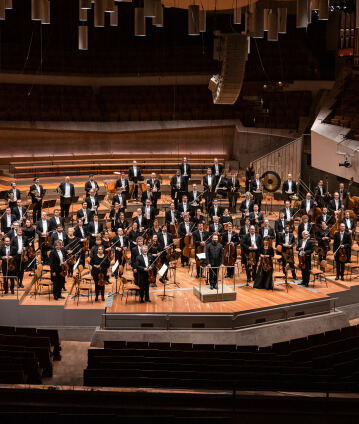Kirill Petrenko conducts Tchaikovsky and Rachmaninov

In this concert, Kirill Petrenko presents three passionate symphonic poems from Russia. Pyotr Ilyich Tchaikovsky is represented by two tragic love stories: the Fantasy Overture Romeo and Juliet – the 29-year-old composer’s first masterpiece – and the fantasy for orchestra Francesca da Rimini. From Sergei Rachmaninov, a composer who is particularly close to Kirill Petrenko’s heart, we also hear his mysterious and sombre Isle of the Dead, inspired by Arnold Böcklin’s painting of the same name.
Music was “never an empty interplay of notes” for Tchaikovsky; it should “always contain a programme”, as the composer wrote to his patroness Nadezhda von Meck. So it is no surprise that he was “particularly in his element in the field of programme music”, because it was precisely here that “his appealing melodiousness, his inventiveness in harmony, his ingenious rhythms and his effective and colourful orchestration could be shown to full advantage” (César Cui).
“Of everything that Tchaikovsky composed up to the last months of his life,” wrote Vladimir Stasov, one of the most influential Russian critics, in 1901, “there is nothing that surpasses his symphonic fantasias Romeo and Juliet, The Tempest and Francesca da Rimini.” The public took a similar view: the composer was acclaimed at the premiere of the fantasy overture Romeo and Juliet. The orchestral fantasy Francesca da Rimini, in which the Dante story is set with extreme contrasts from the love scene to purgatory, was also met with delight from the very first performance. One review of the premiere described the “dazzling interplay of orchestral colours that are inexhaustibly rich and constantly changing”.
Sergei Rachmaninov’s highly dramatic tone poem Isle of the Dead has also been very well received since its premiere: it presents music that reflects the archaic, dark atmosphere of the eponymous Böcklin painting with muffled drumbeats and centres on a passionate farewell to life.
© 2021 Berlin Phil Media GmbH
Related interviews
Artists
Our recommendations
- Kirill Petrenko with Rachmaninov’s “Francesca da Rimini”
- Kirill Petrenko conducts Mozart, Berg and Brahms
- Kirill Petrenko and András Schiff with works by Brahms and Suk
- Kirill Petrenko conducts Tchaikovsky’s “Mazeppa”
- Kirill Petrenko conducts Shostakovich’s Eighth Symphony
- Season opening 2018: Kirill Petrenko conducts Beethoven and Strauss